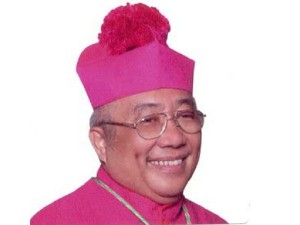A ranking Catholic prelate on Saturday urged the government to implement the deployment ban on 41 countries found to be lacking in protection for overseas Filipino workers (OFWs).
Batangas Archbishop Ramon Arguelles, who once headed the Catholic Bishops’ Conference of the Philippines’ Episcopal Commission on Migrants and Itinerant People (ECMI), urged the Department of Foreign Affairs (DFA) to prioritize the “interests of OFWs.”
The DFA, facing protests from some labor-receiving countries, had urged the Department of Labor and Employment to defer the implementation of the deployment ban.
“Please tell the DFA not to close their eyes or minds. Money is not enough. Human dignity is worth more than the dollars these heroes remit,” Arguelles said.
“The adverse effects (of a deployment ban) would be less than the inhuman treatment (of OFWs) in problematic countries,” he said.
Arguelles said that even when he headed ECMI, his stand was for “a total ban on countries whose cultural mindset is discriminatory to women and strangers like in most Arab lands.”
The labor department earlier announced that it was banning the deployment of OFWs to 41 countries because the DFA had certified that they did not meet the safety requirements for Filipino workers set by the Migrant Workers Act.
That law states that countries where OFWs work should have “existing labor and social laws protecting the rights of workers; are a signatory to and/or a ratifier of multilateral conventions, declarations or resolutions relating to the protection of workers; and have concluded a bilateral agreement or arrangement with the government on the protection of the rights of OFWs.”
The countries on the list are Afghanistan, Antigua and Barbuda, Barbados, Cambodia, Cayman Islands, Chad, Croatia, Cuba, North Korea, Dominica, East Timor, Eritrea, Haiti, India, Iraq, Kyrgyzstan, Lebanon, Lesotho, Libya, Mali, Mauritania, Montenegro, Mozambique, Nauru, Nepal, Niger, Pakistan, Palestine, Serbia, St. Kitts and Nevis, St. Lucia, St. Vincent & the Grenadines, Sudan, Swaziland, Tajikistan, Tonga, Turks and Caicos, Tuvalu, US Virgin Islands, Vanuatu and Zimbabwe.
Saudi Arabia and the United Arab Emirates, which are well known to have few laws protecting domestic labor, are not on the list.
Ople said the recruitment industry and millions of OFWs were waiting for the next and final list that would include several Gulf countries with a high concentration of Filipino workers.
Migrant labor organizations have yet to question the new law’s impact on their basic freedom of mobility and employment.
